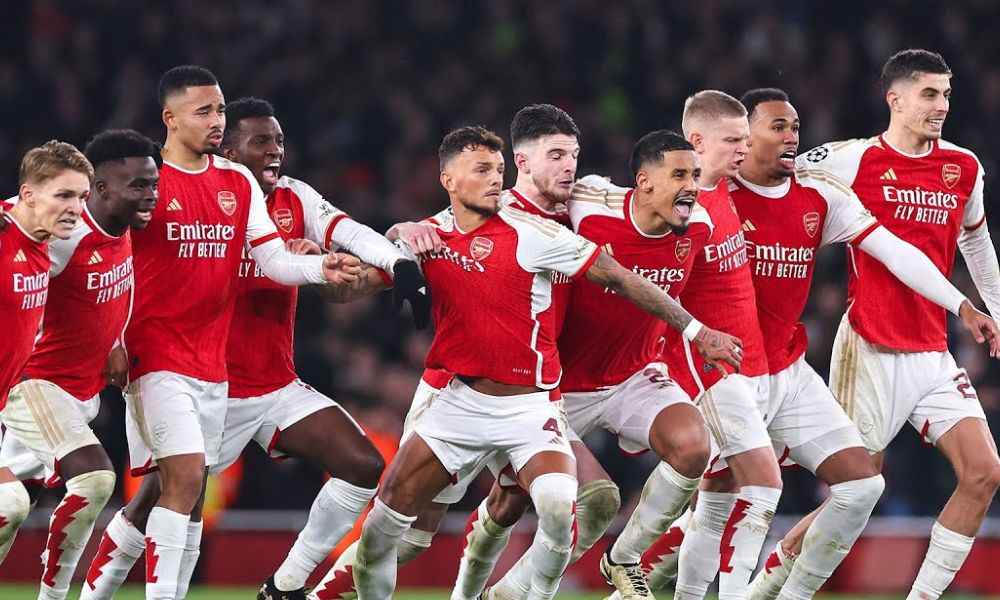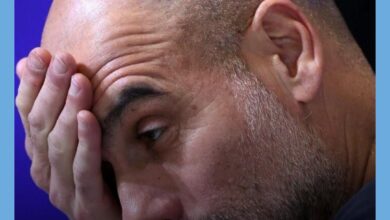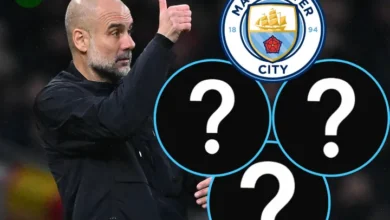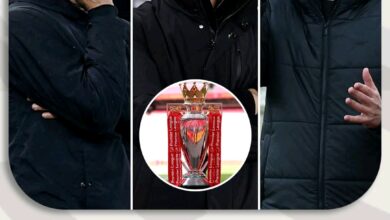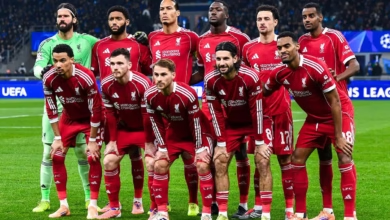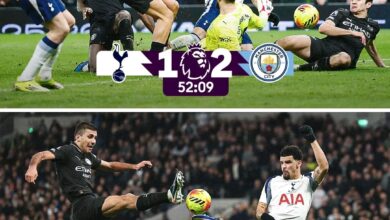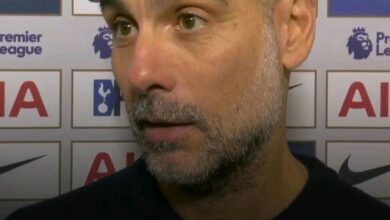Liverpool’s Defensive Dilemma: Why Fans Want Slot to Prioritize Centre-Back Over Isak
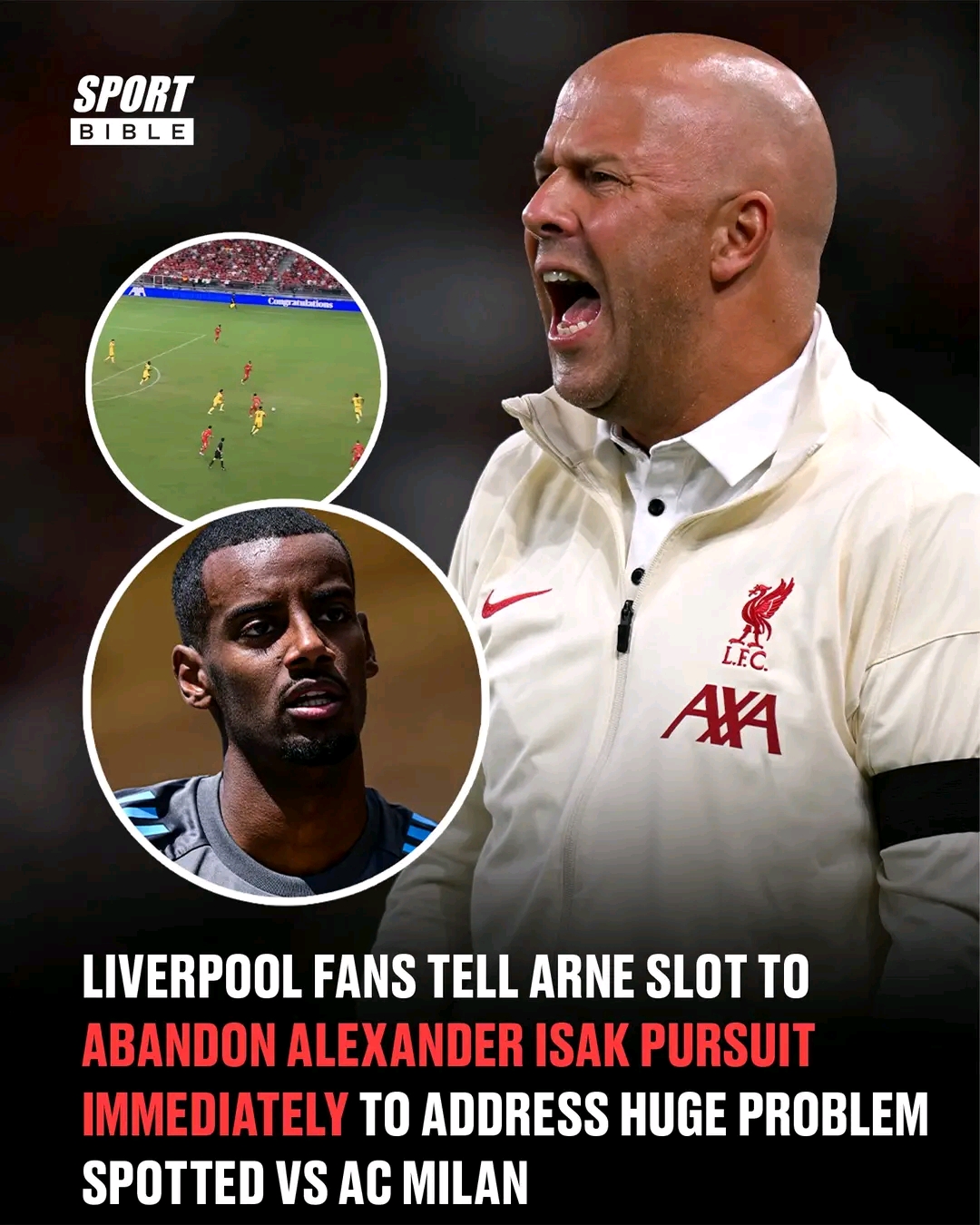
Liverpool’s pre-season preparations have taken an unexpected turn following their 4-2 defeat to AC Milan in their opening friendly of their Asian tour. While the result itself might be dismissed as typical pre-season fare, the performance has exposed a critical vulnerability that has sent alarm bells ringing throughout the Anfield faithful. The match has sparked intense debate about the club’s transfer priorities, with supporters now urging manager Arne Slot to abandon his pursuit of Newcastle United striker Alexander Isak in favor of addressing what many see as a more pressing concern: the lack of depth in central defense
Liverpool’s summer transfer window has been nothing short of extraordinary. The Premier League champions have already committed £265 million to strengthening their squad, demonstrating their intent to maintain their position at the summit of English football. The marquee signings have been impressive both in quality and quantity, with Florian Wirtz arriving from Bayer Leverkusen as the crown jewel of their recruitment drive.
The German attacking midfielder, widely regarded as one of Europe’s most promising talents, has been joined by his Leverkusen teammate Jeremie Frimpong, adding pace and creativity to Liverpool’s attacking arsenal. The club has also secured the services of Bournemouth’s promising left-back Milos Kerkez, providing competition and depth in the full-back positions that have been crucial to Liverpool’s tactical setup under their possession-based system.
In goal, the acquisition of Giorgi Mamardashvili represents a long-term investment, with the Georgian international seen as a potential successor to the aging Alisson Becker. Perhaps most intriguingly, Hugo Ekitike’s £79 million arrival from Eintracht Frankfurt signals Liverpool’s commitment to refreshing their attacking options, with the French striker bringing youth and versatility to complement their existing forward line. However, despite this substantial outlay, the focus has now shifted to another potential blockbuster signing. Alexander Isak, Newcastle United’s prolific Swedish striker, has emerged as Liverpool’s primary target for what could be their final major acquisition of the summer window.
The pursuit of Alexander Isak represents more than just another transfer story; it embodies Liverpool’s ambition to continue evolving their attacking philosophy. The 25-year-old Swede has established himself as one of the Premier League’s most clinical finishers since his move to Newcastle United, consistently delivering performances that have caught the attention of Europe’s elite clubs.
Isak’s situation at St. James’ Park has become increasingly complex. Despite Newcastle’s significant investment in recent years and their qualification for European competition, the striker is reportedly unsettled and seeking a move to a club with greater prospects of challenging for major honors. His rejection of a lucrative offer from Saudi Arabia has demonstrated his commitment to remaining in elite European football, with Liverpool emerging as the frontrunners for his signature.
According to transfer expert Fabrizio Romano, Liverpool are currently the only club engaged in “concrete talks” with both Newcastle and Isak’s representatives. The Italian journalist’s reputation for accuracy in transfer matters lends significant weight to these reports, suggesting that Liverpool’s interest goes beyond mere speculation.
The potential acquisition of Isak would represent a significant tactical shift for Liverpool. His style of play differs markedly from their current attacking options, offering a more traditional center-forward presence that could provide alternative solutions when their usual fluid attacking approach encounters stubborn defensive setups. His ability to hold up play, create space for teammates, and finish clinically in the penalty area would add a new dimension to Liverpool’s already potent attack.
However, the financial implications of such a move cannot be ignored. Following their substantial summer spending, adding Isak to their ranks would push Liverpool’s total outlay well beyond the £300 million mark, representing one of the most expensive transfer windows in the club’s history. While the club’s financial position remains strong, supported by their recent success and commercial growth, such expenditure would require careful consideration of Financial Fair Play regulations and long-term sustainability.
Liverpool’s pre-season opener against AC Milan was intended to be a routine exercise in match fitness and tactical preparation. Instead, it became a stark reminder of the fine margins that separate success from potential disaster in modern football. The 4-2 defeat, while disappointing, was less concerning than the circumstances that led to it.
Florian Wirtz, making his first appearance in Liverpool colors, was deployed in an unfamiliar striker role, a tactical experiment that highlighted both his versatility and the current limitations in Liverpool’s forward options. While the German international showed flashes of his undeniable quality, his performance also underscored the challenges of adapting to new tactical demands and teammates. However, it was Liverpool’s defensive display that truly alarmed supporters. The absence of key personnel exposed the alarming lack of depth in central defense, a situation that had been brewing throughout the summer but was brought into sharp focus by the Milan match.
Joe Gomez’s injury, which forced him to return home from the tour with an Achilles problem, served as a sobering reminder of football’s unpredictability. The English defender, who has been a reliable squad player throughout his Liverpool career, suddenly found himself sidelined at a crucial period in the club’s preparations.
More significantly, the decision to allow Jarell Quansah to join Bayer Leverkusen earlier in the summer has left Liverpool dangerously exposed. The young defender, who had shown promise in his limited first-team appearances, was seen as a valuable squad option who could provide cover in central defense. His departure, while financially beneficial, has created a void that has yet to be filled.
Liverpool’s central defensive options heading into the new season paint a concerning picture. Virgil van Dijk remains the cornerstone of their defense, his leadership and quality undisputed despite entering the latter stages of his career. The Dutch captain’s partnership with Ibrahima Konate has shown promise when both players are available, combining van Dijk’s experience and aerial prowess with Konate’s pace and physicality.
However, beyond this first-choice pairing, Liverpool’s options become alarmingly thin. Ryan Gravenberch’s deployment as a makeshift center-back against Milan demonstrated the club’s current predicament. While the Dutch midfielder possesses the technical ability and physical attributes to perform adequately in this role, his natural position remains in midfield, where his creativity and passing range are better utilized.
Wataru Endo, primarily a defensive midfielder, represents another emergency option, but like Gravenberch, his deployment in central defense would weaken Liverpool’s midfield options. This domino effect illustrates the interconnected nature of squad planning and the potential consequences of leaving positions understaffed. The injury-prone nature of some squad members adds another layer of complexity. Konate, despite his undeniable quality, has struggled with fitness issues throughout his Liverpool career. His absence would leave van Dijk partnered with inexperienced or out-of-position teammates, a scenario that could prove costly during crucial periods of the season.
Joel Matip’s departure at the end of his contract has further reduced Liverpool’s options. The Cameroonian defender, while not always first choice, provided valuable experience and versatility that is now missing from the squad. His ability to step in during injury crises and maintain standards was perhaps undervalued until his absence became apparent
The response from Liverpool supporters following the Milan defeat has been swift and decisive. Social media platforms have been flooded with calls for the club to reassess their transfer priorities, with many fans expressing genuine concern about the defensive situation.
The immediacy and intensity of the fan reaction reflect the sophisticated understanding modern supporters have of tactical nuances and squad planning. Comments such as “This cb issue is urgent, put those isak plans on hold” demonstrate a clear recognition that squad balance takes precedence over individual star signings, regardless of their quality.
The sentiment “One injury to Konate and we’re cooked” encapsulates the precarious nature of Liverpool’s current defensive setup. It’s a stark assessment that highlights how dependent the club has become on the fitness of their first-choice defenders, a situation that leaves little room for the inevitable injuries and suspensions that occur throughout a long season.
Perhaps most tellingly, supporters have identified the timing issue with Quansah’s departure. The observation that “We sold Quansah in like mid June and still haven’t got another centre back in” highlights concerns about the club’s planning and prioritization. While Liverpool’s offensive acquisitions have been impressive, the failure to replace departing defensive personnel has created an imbalance that could prove costly.
The fan reaction also reflects a broader understanding of modern football’s demands. The recognition that “we literally have 3 natural centre backs on our books and one of them gets injured every 5 minutes” demonstrates awareness of how fixture congestion, multiple competitions, and the physical demands of contemporary football require substantial squad depth.
Liverpool manager Arne Slot’s response to questions about his defensive options revealed both optimism and pragmatism. His assertion that “I don’t think we have a concern at centre back” might be viewed as an attempt to project confidence publicly while privately acknowledging the need for reinforcements.
Slot’s mention of Ryan Gravenberch’s versatility and Wataru Endo’s ability to play in central defense demonstrates tactical flexibility, but also highlights the compromises required when squads lack specialist depth. While both players can perform adequately in emergency situations, their deployment in unfamiliar positions could weaken other areas of the team.
The Dutch manager’s acknowledgment that “Jarell Quansah left and we haven’t replaced him yet” was perhaps the most significant aspect of his comments. The word “yet” suggests that Liverpool are aware of the situation and may be working on solutions, but it also confirms that they are currently operating with insufficient depth in this crucial area. Slot’s calm demeanor in addressing these concerns reflects his experience and tactical acumen, but the underlying message remains clear: Liverpool are currently vulnerable in central defense, and this vulnerability could be exploited by opponents throughout the season.
Liverpool’s tactical approach under Slot has emphasized possession-based football with high defensive lines and aggressive pressing. This system places enormous demands on central defenders, who must be comfortable playing out from the back, dealing with space behind the defense, and maintaining concentration during long periods of the game. The current shortage of specialist center-backs could force tactical compromises that undermine the effectiveness of this approach. Playing midfielders out of position or rushing inexperienced players into crucial matches could disrupt the team’s rhythm and expose them to counter-attacking threats.
Furthermore, the physical and mental demands of Liverpool’s playing style require rotation options to maintain performance levels throughout a long season. Without adequate depth, key players may become overused, increasing injury risk and potentially leading to fatigue-related performance drops during crucial periods. The interconnected nature of Liverpool’s tactical system means that weakness in one area can have cascading effects throughout the team. If central defenders are uncertain or uncomfortable in their roles, it can affect the goalkeeper’s distribution, midfield positioning, and even attacking patterns.
The debate over Alexander Isak versus defensive reinforcements also highlights important questions about resource allocation and transfer strategy. While Isak would undoubtedly improve Liverpool’s attacking options, the marginal gain from his addition might be less significant than addressing the critical shortage in central defense. Liverpool’s existing attacking options, including their recent signings, already provide substantial quality and depth. The addition of Wirtz, Ekitike, and the continued presence of established stars suggests that attacking areas are well-covered, making the pursuit of another forward less urgent than defensive reinforcements.
The financial implications of pursuing Isak could also limit Liverpool’s ability to address other squad needs. Transfer budgets, while substantial, are not unlimited, and the club must balance immediate needs with long-term planning and Financial Fair Play considerations. From a risk management perspective, investing in defensive depth represents a more prudent approach than adding another attacking option. The consequences of defensive failures are often more severe than missed attacking opportunities, particularly in crucial matches and competitions.
Liverpool’s situation reflects broader trends in modern football transfer markets. The focus on headline signings and attacking players often overshadows the less glamorous but equally important work of maintaining squad depth and balance. The increasing physical demands of contemporary football, combined with expanded fixture lists and multiple competitions, make squad depth more crucial than ever. Teams that fail to plan adequately for injuries and rotation needs often find themselves exposed during crucial periods of the season.
Liverpool’s success in recent years has been built on strong foundations throughout the squad, not just star players. The club’s ability to maintain performance levels despite injuries and suspensions has been a key factor in their achievements, making the current defensive shortage particularly concerning. The fan reaction also demonstrates the sophisticated understanding modern supporters have of tactical and strategic considerations. The immediate recognition of the defensive problem and calls for priority reassessment show how engaged and knowledgeable contemporary football audiences have become.
Addressing Liverpool’s defensive shortage requires immediate action and long-term planning. The club could explore several options, from established Premier League defenders to emerging talents from other leagues. The loan market might offer short-term solutions, allowing Liverpool to add defensive depth without committing to long-term contracts or massive transfer fees. This approach could provide breathing space while more permanent solutions are identified and pursued.
Alternatively, Liverpool could accelerate the development of academy graduates, providing opportunities for young defenders to step up and fill the void. While this approach carries risks, it also offers potential long-term benefits and maintains the club’s tradition of developing homegrown talent. The club might also consider versatile players who can operate in multiple positions, maximizing squad utility while addressing specific needs. This approach requires careful scouting and assessment but can provide excellent value for money
Liverpool’s pre-season defeat to AC Milan has exposed a critical vulnerability that threatens to undermine their preparations for the upcoming season. While the pursuit of Alexander Isak represents an exciting opportunity to add quality to their attacking options, the urgent need for defensive reinforcements cannot be ignored.
The fan reaction has been clear and decisive: address the defensive shortage before pursuing luxury signings elsewhere. This pragmatic approach recognizes that squad balance and depth are more important than individual star acquisitions, regardless of their quality. Arne Slot faces a crucial decision that will shape Liverpool’s season. The choice between immediate attacking gratification and defensive security could determine whether Liverpool maintain their position among Europe’s elite or suffer the consequences of poor squad planning.
The next few weeks will reveal whether Liverpool’s hierarchy shares the supporters’ concerns and acts accordingly. The club’s response to this challenge will provide insight into their long-term planning and commitment to squad balance over marquee signings. As the new season approaches, Liverpool’s defensive situation serves as a reminder that success in modern football requires attention to detail and comprehensive squad planning. The most successful teams are those that prepare for every eventuality, not just the most glamorous scenarios.
The Alexander Isak pursuit may capture headlines, but Liverpool’s true test lies in addressing the less glamorous but equally crucial task of ensuring defensive stability. How they respond to this challenge will determine whether their ambitious summer spending translates into continued success or expensive disappointment.
